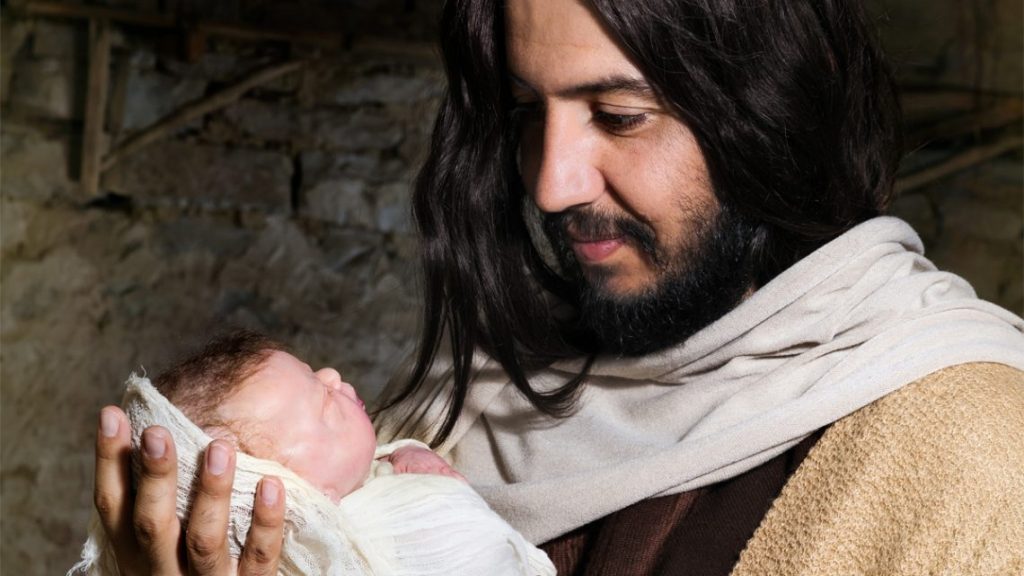
Throughout this season of Advent our focus is “The Story of Christmas in 20 Words.” On each of the 20 weekday mornings ending on Christmas Eve, we’ll spotlight a single word from the Gospel accounts that helps us ponder more deeply the birth of Jesus.
7. Did
In the story of Jesus, Joseph is a bit like the father of the bride at a wedding.
He’s prominent at the beginning. Then he disappears. But in the end has to pay for everything.
We know very little about the man who assumed the role of Jesus’ father. Aside from several key anecdotes associated with Jesus’ birth, we see him only once more in the Gospel accounts – when Jesus at the age of 12 is engaging some of Israel’s teachers in a theological bull session. He is identified in several texts as “Joseph the carpenter,” a trade which he apparently taught his son. The word translated “carpenter” – tekton – is at the root of our modern word “technology,” and described someone who could work with both wood and stone.
Since Mary always appears alone during the accounts of Jesus’ adult ministry, it has long been assumed that she was widowed by the time her son turned 30.
What happened to Joseph? No one can say. What was he like as a father, and what kind of child was Jesus? Those questions proved to be so interesting to the early church that a few creative authors couldn’t resist the temptation to invent fanciful back stories.
Some of them appear in The Infancy Gospel of Thomas, a spurious document that was written at least 150 years after Jesus’ birth, and certainly not by the apostle Thomas. The young Jesus is presented as an arrogant brat who practices magic tricks. Joseph tries to redirect his talents to more positive ends, coming across like Peter Parker’s uncle in Spiderman: “With great power comes great responsibility.”
In other “childhood narratives,” Jesus makes birds out of mud, claps his hands, and brings them to life – something that genuinely impresses his playmates. When Joseph cuts a board too short, he calmly assures his dad that he’s got the problem covered and pulls it out to the right length. When a neighborhood boy disrespects him, Jesus strikes him dead.
The early church, to its credit, recognized that such stories were absurdly out of character with everything else we know about Jesus.
The History of Joseph the Carpenter, another document of dubious validity, suggests that Joseph was a whopping 90 years old when he became engaged to Mary, and was a widower with six grown children. Italian Renaissance painters occasionally portrayed him as an old man cradling his newborn son.
These artists and authors seemed to think that Joseph needed to be more like a grandfather (or great-grandfather) to Mary than a young husband – someone old enough and wise enough to take care of a vulnerable wife and child.
But there seems little reason to doubt that Joseph and Mary had three things in common: They were both starting out in life, they both loved God, and they both displayed extraordinary courage.
If Joseph was typical of other young men in Israel, he was 16-18 years old at the time of his engagement to Mary. And assuming that he shared the typical sentiments of any man who has ever been engaged, he must have been devastated by the news of her pregnancy. The Bible reports his response in a single poignant sentence: “Joseph, being a righteous man and unwilling to expose her to public disgrace, planned to dismiss her quietly” (Matthew 1:19).
Engagement was serious business in first century Palestine. It could only be terminated by divorce.
Joseph could make a big scene to protect his reputation: “Hey, it wasn’t me. It’s her! Can you blame me for dodging a bullet by backing out of this marriage?” We get a sense of Joseph’s compassion when we learn that he plans to sever the relationship quietly, behind the scenes, without subjecting Mary to the inevitable cascade of public shame.
Then an angel appears to him in a dream. Like Mary, he learns that this is not an ordinary pregnancy, and these are not ordinary circumstances.
Matthew 1:24 goes straight to the heart: “When Joseph woke up, he did what the angel of the Lord commanded him and took Mary home as his wife.”
He did what the angel (that is, God) commanded him.
This is prompt, simple, unspectacular obedience.
It’s fascinating that Joseph never speaks in any of the Gospel accounts. He silently does what is right. He chooses to come alongside Mary and endure what will undoubtedly be a lifetime of public misunderstanding. He will not leave her alone in an impossible situation. Joseph doesn’t journal about his feelings, talk things over with his small group, or post a message to his Facebook page that he is thinking about devoting the following year to an exploration of his spiritual identity.
He simply does what God asks. Pastor Adam Hamilton gave his account of Joseph’s life a one-word title: Faithful.
Joseph’s willingness to walk steadily with God – to “pray and obey,” as the old saying goes – prepares him for two more dreams: the one that will prompt him to take his wife and child to Egypt for safe-keeping from the murderous Herod, and another that will prompt him to return his family to Nazareth.
As Bible scholar Dale Bruner reminds us, Jesus will not greet his followers in the next world with the words, “Well done, good and flashy servant.”
Like Joseph, we can be good and faithful servants.
Let it be said of us what has been said of Jesus’ earthly father for twenty centuries:
He simply did what God commanded.
